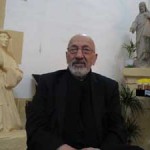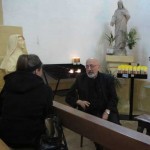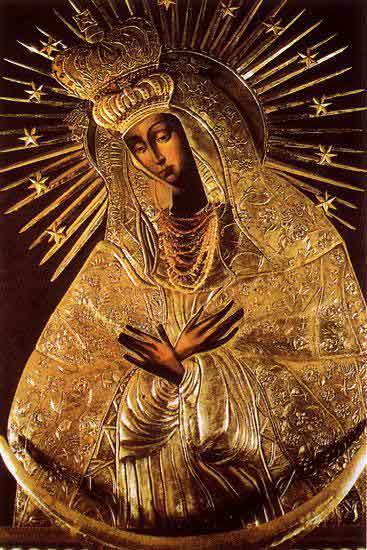.
 see also Pope Benedict’s teachings on St. Gertrude on the Discerning Hearts Holy Women page
see also Pope Benedict’s teachings on St. Gertrude on the Discerning Hearts Holy Women page
(1256-1302 A.D.) Few men have merited the title, “the Great”; fewer women. I know of only one nun so honored, St. Gertrude of Helfta, a mystic whose spiritual writings have remained influential up to the present.
Nothing is known of this German woman’s family background. When five years old, she was entrusted to the sisters of Helfta Abbey to be educated. From a very young age she gave evidence of her brilliance and quickly outstripped her companions. In her teen years she asked to join the community. Therefore, she probably spent her whole life from childhood on within the abbey walls.
Her love for secular studies made the common life wearisome, pride and vanity ate away at her soul and she soon became an unhappy young woman until Christ appeared to her. The day was branded in her memory, it was in her 26th year, when as she says “in a happy hour, at the beginning of twilight, thou O God of truth, more radiant than any light, yet deeper than any secret thing, determined to dissolve the obscurity of my darkness.” From then on her biographer tells us “she became a theologian instead of a grammarian.” She did not give up her intellectual ardor but now, all her labors were for her sisters, to cure what she termed “the wound of ignorance”. Her many gifts and mystical graces did not prevent her from giving herself wholeheartedly to the common life with its joys and sorrows. In fact many of her special graces came to her as she took part in the ordinary routine of convent life. She felt keenly for those whose burdens involved them in distracting duties, for example those responsible for meeting the debts of the monastery.
She prayed that they might have more time to pray and fewer distractions. The Lord’s answered “It does not matter to me whether you perform spiritual exercises or manual labor, provided only that your will is directed to me with a right intention. If I took pleasure only in your spiritual exercises, I should certainly have reformed human nature after Adam’s fall so that it would not need food, clothing or the other things that man must find or make with such effort.”
Many of her writings are lost, but fortunately she left to the world an abundance of spiritual joy in her book The Herald of Divine Love, in which she tells of the visions granted her by our divine Lord. She wrote this excellent, small book because she was told that nothing was given to her for her own sake only. Her Exercises is an excellent treatise on the renewal of baptismal vows, spiritual conversion, religious vows, love, praise, gratitude to God, reparation, and preparation for death.
She began to record her supernatural and mystical experiences in what eventually became her Book of Extraordinary Grace (Revelation of Saint Gertrude), together with Mechtilde’s mystical experiences Liber Specialis Gratiae, which Gertrude recorded. Most of the book was actually written by others based on Gertrude’s notes. She also wrote with or for Saint Mechtilde a series of prayers that became very popular, and through her writings helped spread devotion to the Sacred Heart (though it was not so called until revealed to St. Margaret Mary Alocoque).
Gertrude is inseparably associated with the devotion to the Sacred Heart. The pierced hear
t of Jesus embodied for her the Divine Love, an inexhaustible fountain of redemptive life. Her visions and insights in connection with the Heart of Jesus are very enlightening. In one such intellectual vision, she perceived the unceasing love of Christ for us in two pulsations of his Heart – one accomplished the conversion of sinners, the other the sanctification of the just. Just as our own faithful heart keeps right on whether we advert to it or not, these pulsations will endure till the end of time despite the vicissitudes of history.
Our Lord wishes people to pray for the souls in purgatory. He once showed Gertrude a table of gold on which were many costly pearls. The pearls were prayers for the holy souls. At the same time the saint had a vision of souls freed from suffering and ascending in the form of bright sparks to heaven.
In one Vision, Our Lord tells Gertrude that he longs for someone to ask Him to release souls from purgatory, just as a king who imprisons a friend for justice’s sake hopes that someone will beg for mercy for his friend. Jesus ends with:
“I accept with highest pleasure what is offered to Me for the poor souls, for I long inexpressibly to have near Me those for whom I paid so great a price. By the prayers of thy loving soul, I am induced to free a prisoner from purgatory as often as thou dost move thy tongue to utter a word of prayer.” (more…)
Tags: benedictine, catholic, catholic podcast, catholic prayer, cathollc spirituality, devotion, family, jesus christ, love, mystic of the Church, mystical experiences, sacred heart, sacred heart of jesus, spiritual exercises, spiritual writings, st gertrude, women of the middle ages
This entry was posted on Wednesday, November 16th, 2011 at 2:30 am
You can follow any responses to this entry through the RSS 2.0 feed.
“Surrender! The Life Changing Power of Doing God’s Will” is another outstanding offering from Fr. Larry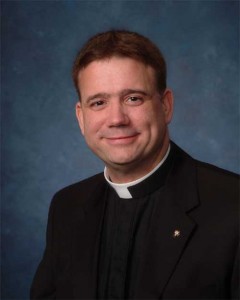 Richards!  From start to finish Fr. Larry  challenges us to place Jesus Christ first  in our lives and in our relationships with others and the world.  Once we can do that, things begin to fall in place.  Then he helps us to recognize the difference between God’s will and our will, and to trust that His will be better for us if we trust, love and….SURRENDER!
Richards!  From start to finish Fr. Larry  challenges us to place Jesus Christ first  in our lives and in our relationships with others and the world.  Once we can do that, things begin to fall in place.  Then he helps us to recognize the difference between God’s will and our will, and to trust that His will be better for us if we trust, love and….SURRENDER!
[powerpress]
Fr. Larry Richards is an engaging writer, who never fails to keep us hooked through the entire book. Â This will be one of those books that you want to purchase at least two copies, because you’ll want to pass it on to another, and you’ll want to keep one for yourself for years to come.
You can find the book here
Also check out Fr. Larry’s other Discerning Hearts interview
for his book “Be A Man!”
Tags: catholic, catholic podcast, catholic prayer, cathollc spirituality
This entry was posted on Monday, November 14th, 2011 at 3:00 pm
You can follow any responses to this entry through the RSS 2.0 feed.
Episode 3- Communion with Christ – Practical Prayer –  Jesus is the primary teacher of prayer.   How can we pray “always”?  How do we become “prayer”?  Jesus was so conscious that all things flows from the Father, and teaches a rise in gratitude to the source of “all things”…and He teaches us how to pray to the Father.  Praying in the name of Jesus and the “receiving” of God in our hearts.
 How can we pray “always”?  How do we become “prayer”?  Jesus was so conscious that all things flows from the Father, and teaches a rise in gratitude to the source of “all things”…and He teaches us how to pray to the Father.  Praying in the name of Jesus and the “receiving” of God in our hearts.
[powerpress]
Deacon James Keating, PhD, the director of Theological Formation for the Institute for Priestly Formation, located at Creighton University, in Omaha.
 From the Catechism of the Catholic Church paragraph 2604
From the Catechism of the Catholic Church paragraph 2604
The second prayer, before the raising of Lazarus, is recorded by St. John.50Â Thanksgiving precedes the event: “Father, I thank you for having heard me,” which implies that the Father always hears his petitions. Jesus immediately adds: “I know that you always hear me,” which implies that Jesus, on his part, constantly made such petitions. Jesus’ prayer, characterized by thanksgiving, reveals to us how to ask: before the gift is given, Jesus commits himself to the One who in giving gives himself. the Giver is more precious than the gift; he is the “treasure”; in him abides his Son’s heart; the gift is given “as well.”51
For more information on the “Institute of Priestly Formation†and for other material available by Deacon Keating, just click here
Don’t forget to pickup a copy of “Communion with Christ†, it is one of the best audio sets on prayer…ever!
Check out Deacon Keating’s “Discerning Heart†page
Tags: catholic, catholic podcast, catholic prayer, cathollc spirituality, creighton university, Deacon Keating, institute for priestly formation, james keating, theological formation
This entry was posted on Friday, November 11th, 2011 at 7:04 am
You can follow any responses to this entry through the RSS 2.0 feed.
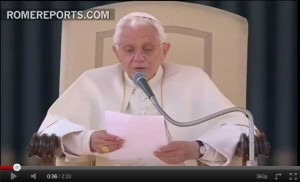 VATICAN CITY, 9 NOV 2011 (VIS) –
VATICAN CITY, 9 NOV 2011 (VIS) –
In his general audience this morning Benedict XVI focused his catechesis on Psalm 119, the longest of the Psalms, constructed as an acrostic in which each stanza begins with one of the twenty-two letters of the Hebrew alphabet. Its subject matter is “the Torah of the Lord; that is, His Law, a term which in its broadest and most complete definition comprehends teaching, instruction and life guidance. The Torah is revelation, it is the Word of God which is addressed to man and which arouses his response of faithful obedience and generous love”, the Pope said.
“The Psalmist’s faithfulness arises from listening to the Word, from keeping it in his heart, meditating upon it and loving it, like Mary who  ‘treasured in her heart’ the words addressed to her, the marvellous events in which God revealed Himself and asked for her response of faith”, he explained. The Psalmist describes those who walk in the Law of the Lord as blessed, and indeed “Mary is blessed because she bore the Saviour in her womb, but above all because she accepted God’s annunciation and treasured His Word attentively and lovingly”.
‘treasured in her heart’ the words addressed to her, the marvellous events in which God revealed Himself and asked for her response of faith”, he explained. The Psalmist describes those who walk in the Law of the Lord as blessed, and indeed “Mary is blessed because she bore the Saviour in her womb, but above all because she accepted God’s annunciation and treasured His Word attentively and lovingly”.
Psalm 119 is constructed around this Word of life and blessing. Its central theme is the Word and the Law, and its verses are replete with synonyms thereof such as “precepts, decrees, promises”, associated with verbs such as “to know, to love, to meditate, to live”, the Holy Father explained. “The entire alphabet features in the twenty-two verses of the Psalm, as does the entire vocabulary of the believer’s relationship of trust with God. We find praise, thanksgiving and trust, but also supplication and lamentation; however, all of them are pervaded by the certainty of divine grace and the power of the Word of God. Even those verses most marked by suffering and darkness remain open to hope and are permeated with faith”.
The Law of God, which is “the centre of life”, must be “listened to with obedience but not servility, with filial trust and awareness. To listen to the Word is to have a personal encounter with the Lord of life. … The fulfilment of the Law is to follow Jesus”. Thus Psalm 119 “guides us towards the Gospel”, the Pope explained.
listen to the Word is to have a personal encounter with the Lord of life. … The fulfilment of the Law is to follow Jesus”. Thus Psalm 119 “guides us towards the Gospel”, the Pope explained.
In this context he focused particularly on verse 57: “The Lord is my portion; I promise to keep your words”.
“The term ‘portion'”, he explained, “evokes the partition of the Promised Land among the tribes of Israel, when the Levites were given no part of the territory because their ‘portion’ was the Lord Himself. … These verses are also important for us today, especially for priests, who are called to live from the Lord and from His Word alone, with no other guarantees, no other wealth, and having Him as their one source of true life. It is in this light that we can understand the free choice of celibacy for the Kingdom of heaven, which must be rediscovered in all its beauty and power.
“These verses are also important for the faithful, the People of God who belong only to Him”, the Pope added in conclusion. “They are called to experience the radical nature of the Gospel, to be witnesses of the life brought by Christ, the new and definitive ‘High Priest’ Who offered Himself in sacrifice for the salvation of the world. The Lord and His Word are our ‘land’ in which to live in communion and joy”.
Tags: catholic, catholic podcast, catholic prayer, cathollc spirituality, pope benedict xvi, psalm 119
This entry was posted on Wednesday, November 9th, 2011 at 12:24 pm
You can follow any responses to this entry through the RSS 2.0 feed.
Episode 2-Communion with Christ – Practical Prayer –  We have lost are fear of going astray  and being unfaithful within.  We must be aware of the spirits, personal or impersonal, that can get into us.  We can get tangled up in many different  influences in prayer.  That is why it so important to have a director, a guide,  to help us navigate in this journey and to test those spirits.  Jesus is the model of prayer.  “He learns to pray from His mother”. (see below).   The witness of the community.  His prayer springs from a secret source and He wishes to share it with us.  All prayer is foretaste of heaven.
and being unfaithful within.  We must be aware of the spirits, personal or impersonal, that can get into us.  We can get tangled up in many different  influences in prayer.  That is why it so important to have a director, a guide,  to help us navigate in this journey and to test those spirits.  Jesus is the model of prayer.  “He learns to pray from His mother”. (see below).   The witness of the community.  His prayer springs from a secret source and He wishes to share it with us.  All prayer is foretaste of heaven.
[powerpress]
Deacon James Keating, PhD, the director of Theological Formation for the Institute for Priestly Formation, located at Creighton University, in Omaha.
 From the Catechism of the Catholic Church paragraph 2599
From the Catechism of the Catholic Church paragraph 2599
The Son of God who became Son of the Virgin learned to pray in his human heart. He learns to pray from his mother, who kept all the great things the Almighty had done and treasured them in her heart.41Â He learns to pray in the words and rhythms of the prayer of his people, in the synagogue at Nazareth and the Temple at Jerusalem. But his prayer springs from an otherwise secret source, as he intimates at the age of twelve: “I must be in my Father’s house.”42Â Here the newness of prayer in the fullness of time begins to be revealed: his filial prayer, which the Father awaits from his children, is finally going to be lived out by the only Son in his humanity, with and for men.
For more information on the “Institute of Priestly Formation†and for other material available by Deacon Keating, just click here
Don’t forget to pickup a copy of “Communion with Christ†, it is one of the best audio sets on prayer…ever!
Check out Deacon Keating’s “Discerning Heart†page
Tags: catholic, catholic podcast, catholic prayer, cathollc spirituality, Deacon James Keating, Deacon Keating, james keating, prayer, theological formation
This entry was posted on Thursday, November 3rd, 2011 at 11:20 am
You can follow any responses to this entry through the RSS 2.0 feed.
During his Angelus on Tuesday, Pope Benedict said “the Feast of All Saints is a good time to lift our gaze from the realities of the world… to the enormity of God, who encompasses all eternity and holiness. “
He said holiness is the vocation of all the baptized, and all the people of God are called to be saints.
The Pope then turned his thoughts to Wednesday’s commemoration of All Souls
[powerpress = “Vatican Radio”]
“From the early days of the Christian faith,†he said, “the Church on earth, recognizing the communion of the whole mystical body of Jesus Christ, has with great respect honored the memory of the dead and offered prayers for them.â€The Pope said “our prayers for the dead are not only useful, but necessary.â€
The Holy Father reminded the faithful to keep the bonds of affection with our loved ones who have died, not only through prayer, but also through actions like visiting cemeteries.
He said this reminds us all that we are meant for another life after death.
see more on the website for Vatican Radio
Tags: all saints, catholic, catholic podcast, catholic prayer, cathollc spirituality, pope benedict xvi, prayer, purgatory, vatican radio
This entry was posted on Tuesday, November 1st, 2011 at 2:42 pm
You can follow any responses to this entry through the RSS 2.0 feed.
From Paray le Monial, France, I had the chance to catch up with Msgr. John Esseff at the First Sacred Heart World Congress.  Msgr. Esseff is one of the founders of the Sacred Heart Apostolate, sponsor of this event which brought laity, religious, and priests from around the world.  Talks where given by Cardinal Raymond Burke, Bishop Robert Herman, Christendom College President Timothy O’Donnell, and EWTN show host and author Fr. Mitch Pacwa, as well as many others  Why did they come to this small French community nestled in Eastern France?  Because our Lord choice this place and two very remarkably humble saints to communicate the message of his Sacred Heart.  He said to St. Margaret Mary:
Congress.  Msgr. Esseff is one of the founders of the Sacred Heart Apostolate, sponsor of this event which brought laity, religious, and priests from around the world.  Talks where given by Cardinal Raymond Burke, Bishop Robert Herman, Christendom College President Timothy O’Donnell, and EWTN show host and author Fr. Mitch Pacwa, as well as many others  Why did they come to this small French community nestled in Eastern France?  Because our Lord choice this place and two very remarkably humble saints to communicate the message of his Sacred Heart.  He said to St. Margaret Mary:
[powerpress]
 “My divine Heart is so inflamed with love for mankind … that it can no longer contain within itself the flames of its burning charity and must spread them abroad by your means.” She described that His Heart was on fire and surrounded by a crown of thorns. Our Lord told her that the flames
represented His love for humanity, and the thorns represented man’s sinfulness and ingratitude. Jesus informed her that her mission was to establish the devotion to His Most Sacred Heart, and He revealed twelve promises that He would bestow upon all those who practice the devotion.
She had three more visions over the next year and a half in which Jesus instructed her in a devotion that was to become known as the Nine Fridays. Christ also inspired Margaret Mary to establish the Holy Hour and to receive Holy Communion on the first Friday of every month. In the final revelation, the Lord asked that a feast of reparation be instituted for the Friday after the octave of Corpus Christi.
Blessed Claude de la Colombiere, a holy and experienced Jesuit, arrived as confessor to the nuns, and in him Margaret Mary recognized the understanding guide that had been promised to her in the visions. He became convinced that her experiences were genuine and adopted the teaching of the Sacred Heart that the visions had communicated to her.
Msgr. Esseff talks about that message, what it means for us today, and how we can live it out.
 Â Visit Msgr. Esseff’s website here
 Visit Msgr. Esseff’s website here
Tags: catholic, catholic podcast, catholic prayer, cathollc spirituality, msgr. john esseff, sacred heart, sacred heart apostolate, sacred heart of jesus
This entry was posted on Monday, October 31st, 2011 at 8:54 am
You can follow any responses to this entry through the RSS 2.0 feed.
Episode 1 -Communion with Christ – Practical Prayer –The most powerful principal of prayer is that God desires us.  Prayer is a response to a presence who has entered our reality. Distractions, an enemy of prayer. Recovering the prophetic consciousness.  The highest fruit of prayer to be someone who is so transparent to God, that  God reveals His acts in our lives…the person has become prayer.
Prayer is a response to a presence who has entered our reality. Distractions, an enemy of prayer. Recovering the prophetic consciousness.  The highest fruit of prayer to be someone who is so transparent to God, that  God reveals His acts in our lives…the person has become prayer.
[powerpress]
Deacon James Keating, PhD, the director of Theological Formation for the Institute for Priestly Formation, located at Creighton University, in Omaha.
 From the Catechism of the Catholic Church paragraph 2567
From the Catechism of the Catholic Church paragraph 2567
God calls man first. Man may forget his Creator or hide far from his face; he may run after idols or accuse the deity of having abandoned him; yet the living and true God tirelessly calls each person to that mysterious encounter known as prayer. In prayer, the faithful God’s initiative of love always comes first; our own first step is always a response. As God gradually reveals himself and reveals man to himself, prayer appears as a reciprocal call, a covenant drama. Through words and actions, this drama engages the heart. It unfolds throughout the whole history of salvation.
For more information on the “Institute of Priestly Formation†and for other material available by Deacon Keating, just click here
Don’t forget to pickup a copy of “Communion with Christ†, it is one of the best audio sets on prayer…ever!
Check out Deacon Keating’s “Discerning Heart†page
Tags: catechism of the catholic church, catholic, catholic podcast, catholic prayer, cathollc spirituality, Deacon James Keating, Deacon Keating, institute for priestly formation, james keating, old testament, prayer, prophet, theological formation
This entry was posted on Thursday, October 27th, 2011 at 7:18 am
You can follow any responses to this entry through the RSS 2.0 feed.
 Msgr. Esseff continues his reflections in the Chapel of the Apparitions in Paray le Monial, France.
Msgr. Esseff continues his reflections in the Chapel of the Apparitions in Paray le Monial, France.
[powerpress]
Msgr. Esseff discusses the clash of the two kingdoms….salvation history in light of the Sacred Heart of Jesus. Â In every heart there is a collision between the force of light and the force of darkness, between the force  of lies and the force of truth. Â It’s a collision that is occurring throughout the world.
of lies and the force of truth. Â It’s a collision that is occurring throughout the world.
The Sacred Heart calls us to love to win the battle.
for more visit Msgr. Esseff’s website : Building A Kingdom of Love
Tags: catholic, catholic podcast, catholic prayer, cathollc spirituality, Esseff, John Esseff Msgr, sacred heart of jesus
This entry was posted on Saturday, October 22nd, 2011 at 9:40 am
You can follow any responses to this entry through the RSS 2.0 feed.
St. Paul of the Cross quotes:
When you feel the assaults of passion and anger, then is the time to be silent as Jesus was silent in the midst of His ignominies and sufferings.-St. Paul of the Cross
It is very good and holy to consider the passion of our Lord, and to meditate on it, for by this sacred path we reach union with God. In this most holy school we learn true wisdom, for it was there that all the saints learned it.-St. Paul of the Cross
Therefore, be constant in practicing every virtue, and especially in imitating the patience of our dear Jesus, for this is the summit of pure love. Live in such a way that all may know that you bear outwardly as well as inwardly the image of Christ crucified, the model of all gentleness and mercy. For if a man is united inwardly with the Son of the living God, he also bears his likeness outwardly by his continual practice of heroic goodness, and especially through a patience reinforced by courage, which does not complain either secretly or in public. Conceal yourselves in Jesus crucified, and hope for nothing except that all men be thoroughly converted to his will.-St. Paul of the Cross
I want to set myself on fire with love…I want to be entirely on fire with love…and I want to know how to sing in the fire of love.-St. Paul of the Cross
Look upon the face of the Crucified, who invites you to follow Him. He will be a Father, Mother–everything to you.-St. Paul of the Cross
I hope that God will save me through the merits of the Passion of Jesus. The more difficulties in life, the more I hope in God. By God’s grace I will not lose my soul, but I hope in His mercy.-St. Paul of the Cross
Christ Crucified is a work of love. The miracle of miracles of love. The most stupendous work of the love of God. The bottomless sea of the love of God, where virtues are found, where one can lose oneself in love and sorrow. A sea and a fire or a sea of fire. The most beneficial means of abandoning sin and growing in virtue, and so in holiness.-St. Paul of the Cross
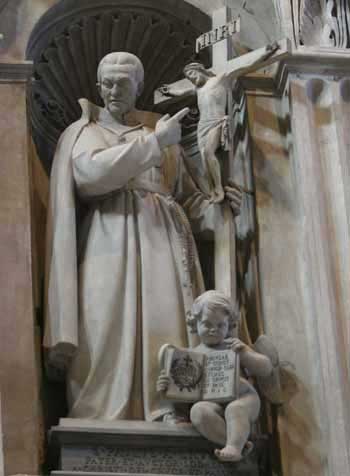 At holy Communion I had much sweetness. My dear God gave me infused knowledge of the joy which the soul will have when we see him face to face, when we will be united with Him in holy love. Then I felt sorrow to see Him offended and I told Him that I would willingly be torn to pieces for a single soul. Indeed, I felt that I would die when I saw the loss of so many souls who do not experience the fruit of the Passion of Jesus.-St. Paul of the Cross
At holy Communion I had much sweetness. My dear God gave me infused knowledge of the joy which the soul will have when we see him face to face, when we will be united with Him in holy love. Then I felt sorrow to see Him offended and I told Him that I would willingly be torn to pieces for a single soul. Indeed, I felt that I would die when I saw the loss of so many souls who do not experience the fruit of the Passion of Jesus.-St. Paul of the Cross
Oh my good God, how gentle You are! How sweet You are! Oh dear cross, I embrace you and press you to my heart!-St. Paul of the Cross
May the mercy of God grant you still more time in life so that you can become completely crucified with the Divine Spouse by means of mystical death, death to everything that is not God, with a continual detachment from all created things, wholly concealed in the divine bosom of the celestial Father in true inner solitude. Do not live any longer in yourself, but let Jesus Christ live in you in such a way that the virtue of this Divine Savior may be resplendent in all your actions, in order that all may see in you a true portrait of the Crucified and sense the sweetest fragrance of the holy virtues of the Lord, in interior and exterior modesty, in patience, in gentleness, suffering, charity, humility, and in all others that follow. -St. Paul of the Cross
Tags: catholic, catholic podcast, catholic prayer, cathollc spirituality, mystic, mystic of the Church, passion of christ, paul of christ, Paul of the Cross, Saint Paul, st, st. paul, the passionist
This entry was posted on Thursday, October 20th, 2011 at 12:09 am
You can follow any responses to this entry through the RSS 2.0 feed.
VATICAN CITY, 19 OCT 2011 (VIS) –
Some 20,000 pilgrims attended Benedict XVI’s general audience, which was held this morning in St. Peter’s Square. Continuing a series of catecheses dedicated to the Psalms, the Holy Father focused his attention on Psalm 136, “a great hymn of praise which celebrates the Lord in the many and repeated manifestations of His goodness down human history”.
The Pope explained how, in Jewish tradition, this Psalm is sung at the end of the Passover supper, and therefore it was probably also pronounced by Jesus at the last Passover He celebrated with His disciples. The text enumerates God’s many interventions in favour of His people “and each proclamation of a salvific action by the Lord is answered by an antiphon reiterating the main cause for praise: God’s eternal love, a love which, according to the Hebrew term used, implies faithfulness, mercy, goodness, grace and tenderness”.
God is first presented as “He Who ‘does great wonders’, first among them that of the creation: heaven, earth and stars. … With the creation the Lord shows Himself in all His goodness and beauty. He commits Himself to life, revealing a desire for good whence all other salvific actions arise”.
The Psalm goes on to consider God’s manifestations in history, evoking the great moment when the Israelites were freed from slavery in Egypt. The forty years of wandering in the desert were “a decisive period for Israel which, allowing itself to be guided by the Lord, learned to live on faith, obedient and docile to the laws of God. Those were difficult years, marked by the harshness of life in the desert, but also a happy time of confidence and filial trust in the Lord”.
“The history of Israel has known exhilarating moments of joy, of fullness of life, of awareness of the presence of God and His salvation”, said the Pope. “But it has also been marked by episodes of sin, painful periods of darkness and profound affliction. Many were the adversaries from whom the Lord liberated His people”. The Psalm speaks of these events, in particular the Babylonian exile and the destruction of Jerusalem, “when it seemed that Israel had lost everything, even its own identity, even its trust in the Lord. However, God remembers, and frees. The salvation of Israel and of all mankind is bound to the Lord’s faithfulness, to His memory. While man forgets easily, God remains faithful: His memory is a precious casket containing that ‘love which endures forever’ about which our Psalm speaks”.
The Psalm concludes by reminding us that God feeds His creatures, “caring for life and giving
bread. … In the fullness of time the Son of God became man to give life, for the salvation of each one of us; and He continues to gives Himself as bread in the mystery of the Eucharist, so as to draw us into His covenant, which makes us children. So great is God’s merciful goodness, the sublimity of His ‘love which endures forever'”. In conclusion the Pope read a quote from the First Letter of St. John, advising the faithful to bear it in mind in their prayers: “See what love the Father has given us, that that we should be called children of God; and that is what we are”.
AG/ VIS 20111019 (560)Â
raise the Lord, for he is good: for his mercy endures for ever.
2 Praise the God of gods: for his mercy endures for ever.Â
3 Praise the Lord of lords: for his mercy endures for ever.Â
4Â Who alone does great wonders: for his mercy endures for ever.Â
5 Who made the heavens in understanding: for his mercy endures for ever.
6Â Who established the earth above the waters: for his mercy endures for ever.
 7 Who made the great lights: for his mercy endures for ever.Â
8Â The sun to rule the day: for his mercy endures for ever.Â
9Â The moon and the stars to rule the night: for his mercy endures for ever.Â
10 Who smote Egypt with their firstborn: for his mercy endures for ever.Â
11 Who brought out Israel from among them: for his mercy endures for ever.Â
12Â With a mighty hand and with a stretched out arm: for his mercy endures for ever.Â
13 Who divided the Red Sea into parts: for his mercy endures for ever.
14 And brought out Israel through the midst thereof: for his mercy endures for ever.Â
15 And overthrew Pharao and his host in the Red Sea: for his mercy endures for ever.Â
16 Who led his people through the desert: for his mercy endures for ever.Â
17Â Who smote great kings: for his mercy endures for ever.Â
18Â And slew strong kings: for his mercy endures for ever.Â
19 Sehon king of the Amorrhites: for his mercy endures for ever.Â
20Â And Og king of Basan: for his mercy endures for ever.Â
21Â And he gave their land for an inheritance: for his mercy endures for ever.Â
22 For an inheritance to his servant Israel: for his mercy endures for ever.Â
23Â For he was mindful of us in our affliction: for his mercy endures for ever.
24 And he redeemed us from our enemies: for his mercy endures for ever.Â
25Â Who gives food to all flesh: for his mercy endures for ever.Â
26 Give glory to the God of heaven: for his mercy endures for ever. Give glory to the Lord of lords: for his mercy endures for ever.
Tags: catholic, catholic podcast, catholic prayer, cathollc spirituality, Israel, pope benedict, pope benedict xvi, prayer, psalm 136
This entry was posted on Wednesday, October 19th, 2011 at 4:02 pm
You can follow any responses to this entry through the RSS 2.0 feed.
Mother of those who place their hope in Solidarity, pray for us.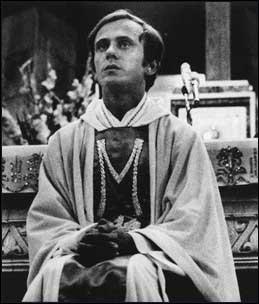
Mother of those who are deceived, pray for us.
Mother of those who are betrayed, pray for us.
Mother of those who are arrested in the night, pray for us.
Mother of those who are imprisoned, pray for us.
Mother of those who suffer from the cold, pray for us.
Mother of those who have been frightened, pray for us.
Mother of those who were subjected to interrogations, pray for us.
Mother of those innocents who have been condemned, pray for us.
Mother of those who speak the truth, pray for us.
Mother of those who cannot be corrupted, pray for us.
Mother of those who resist, pray for us.
Mother of orphans, pray for us.
Mother of those who have been molested because they wore your image, pray for us.
Mother of those who are forced to sign declarations contrary to their conscience, pray for us.
Mother of mothers who weep, pray for us.
Mother of fathers who have been so deeply saddened, pray for us.
Mother of our suffering country _____, pray for us.
Mother of our faithful country _____, pray for us.
We beg you, O mother in whom resides the hope of millions of people, grant us to live in liberty and in truth, in fidelity to you and to your Son. Amen.
Tags: blessed mother, blessed virgin mary, catholic, catholic podcast, catholic prayer, cathollc spirituality, hope, liberty, mother, prayer, suffering, truth
This entry was posted on Wednesday, October 19th, 2011 at 6:00 am
You can follow any responses to this entry through the RSS 2.0 feed.
[powerpress feed = “devotionals-prayers”]
St. Teresa of Avila was a Carmelite nun and a Spanish mystic. She is also known as “St. Teresa of Jesus” or the “Great St. Teresa” to distinguish her from another Carmelite nun, St. Therese of Lisieux (1873-1897) known as “The Little Flower. St. Teresa of Avila is a very much-loved contemplative Catholic saint
She was Teresa de Cepeda y Ahumada, a child of a noble family, born on March 28, 1515 at Avila in Castile. Her mother died when she was fifteen. This event upset her so much that her father sent her to an Augustinian convent in Avila. Her father brought her home after a year and a half when she became ill. After being exposed to monastic life she wished to become a nun, which her father forbade as long as he was living. At the age or twenty or twenty-one she secretly left home and entered the Incarnation of the Carmelite nuns in Avila, after which her father dropped his opposition.
Much of St. Teresa’s life was plagued by illness. In 1538 it appears she suffered from malaria when her father took her from the convent and placed her under doctors care. Despite of this she remained ill and undertook experimental cures by a woman in the town of Becedas. These methods left her in a coma for three days and not able to walk for three years. It was during this time of illness and convalescence that she took to daily mental prayer, which led to her experiences with mystical prayer. She credited her recovery to St. Joseph.
St. Teresa never sought out the mystical experiences that she experienced, but resigned herself to God’s will and considers the experiences a divine blessing. She spent long hours in meditation that she called the “prayer of quiet” and the “prayer of union.” During such prayers she frequently went into a trance, and at times entered upon mystical flights in which she would feel as if her soul were lifted out of her body. She said ecstasy was like a “detachable death” and her soul became awake to God as never before when the faculties and senses are dead.
St. Teresa being a contemplative is well known for her discussion on the grades of prayer through which the soul is focused upon the love of God passes before reaching the “central mansion” of the soul, where Christ lives. She distinguished sharply between the essence of mysticism, which is loving the contemplation of God infused by God’s own love and grace, and the tangential phenomena that may accompany the contemplative life, such as visions, audible sensations, ecstasy, levitation, and stigmata. She, as others, believed that Satan could manipulate such phenomena to corrupt the gullible even when they come from God. St. Teresa felt that the Devil could twist such things in order to cause the individual to be more concerned with these manifestations than with their true mission of loving God entirely.
Although St. Teresa warned against taking the powers of the Devil too seriously, and advised that his powers should be despised (tener en poco). She said Satan was constantly active against Christians, especially the contemplative, trying intensely to block them from their goal of achieving absolute union with God. Although the Devil was powerless against the defense that Christ builds up in a faithful soul, he will rush in at the person’s weakness moments to suggest things that appear reasonable and good but invariably result in feelings of confusion, worthlessness and disgust. He put for ingeniously devised temptations: he encourages self-righteousness and false humility and discourages us from prayer; he causes us to feel guilty for
having received God’s grace and to labor under the impossible burden of trying to earn it; he makes us ill- tempered toward others; he creates illusions and distractions in the intellect; he inspires the doubt and fear that the understanding that we are granted in contemplation is an illusion. Sometimes we feel that we have lost control of our souls, as if demons are tossing us back and forth like balls. Sometimes we feel that we have made no progress, but even when the boat is becalmed, God is secretly stirring in the sails and moving us along.
In 1562, against opposition, she founded a convent in Avila with stricter rules that those that prevailed in Carmelite monasteries. She was determined to establish a small community that would follow the Carmelite contemplative life, especially unceasing prayer. In 1567 she was given permission to establish other convents, and eventually founded seventeen others. She dedicated herself to reforming the Carmelite order. When St. Teresa was fifty-three she met the twenty-six-year-old St. John of the Cross, who was dedicated to reforming the male Carmelite monasteries. Following a period of turbulence within the Carmelites, from 1575 to 1580, the Discalced Reform was recognized as separate.
As St. Teresa was traveling about Spain founding her reformed Carmelite convents her pen was busy too. All of her books have become spiritual classics. Life, her first work and autobiography written in 1565, describes how she experienced a spiritual marriage with Christ as bridegroom to the soul; she had this experience on November 18, 1572. Following this experience she wrote The Way of Perfection (1573), about the life of prayer. This was followed by The Interior Castle (1577), her best-known work, in which she presents a spiritual doctrine using a castle to symbolize the interior life. This latter book was revealed to her on Trinity Sunday, 1577, in which she saw a crystal globe like a castle that contained seven rooms; the seventh, in the center, held the King of Glory. One approached the center, which represents the Union with God, by going through the other rooms of Humility, Practice of Prayer, Meditation, Quiet, Illumination, and Dark Night.
After founding her last convent at Burgos, in 1582, St. Teresa returned in very poor health to Avila. The difficult journey proved to have been too much for her frail condition. She took to her deathbed upon her arrival at the convent and died three days later on October 4, 1582. The next day the Gregorian Calendar went into effect, thus dropping ten days and making her death on October 14. Her feast day is October 15.
St. Teresa was canonized in 1662 by Pope Gregory XV and was declared doctor of the Church, the first woman so honored, in 1970 by Pope Paul VI – The Mystica
Tags: carmelite nuns, catholic, catholic podcast, catholic prayer, cathollc spirituality, mystic, mystic of the Church, mystical experiences, mystical prayer, st teresa of jesus, st. teresa of avila
This entry was posted on Saturday, October 15th, 2011 at 10:41 pm
You can follow any responses to this entry through the RSS 2.0 feed.
God, deliver me from sullen saints. – Saint Teresa of Avila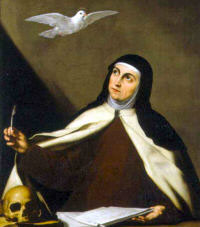
Oh my Lord! How true it is that whoever works for you is paid in troubles! And what a precious price to those who love you if we understand its value. – Saint Teresa of Avila
There is no such thing as bad weather. All weather is good because it is God’s. – Saint Teresa of Avila
There is more value in a little study of humility and in a single act of it than in all the knowledge in the world. – Saint Teresa of Avila
We need no wings to go in search of Him, but have only to look upon Him present within us. – Saint Teresa of Avila
Let nothing trouble you, let nothing make you afraid. All things pass away. God never changes. Patience obtains everything. God alone is enough. – Saint Teresa of Avila
Dream that the more you struggle, the more you prove the love that you bear your God, and the more you will rejoice one day with your Beloved, in a happiness and rapture that can never end. – Saint Teresa of Avila
Hope, O my soul, hope. You know neither the day nor the hour. Watch carefully, for everything passes quickly, even though your impatience makes doubtful what is certain, and turns a very short time into a long one. – Saint Teresa of Avila
You ought to make every effort to free yourselves even from venial sin, and to do what is most perfect. – Saint Teresa of Avila
If Christ Jesus dwells in a man as his friend and noble leader, that man can endure all things, for Christ helps and strengthens us and never abandons us. He is a true friend. And I clearly see that is we expect to please him and receive an abundance of his graces, God desires that these graces must come to us from the hands of Christ, through his most sacred humanity, in which God takes delight. All blessings come to us through our Lord. He will teach us, for in beholding his life we find that he is the best example. What more do we desire from such a good friend at our side? Unlike our friends in the world, he will never abandon us when we are troubled or distressed. Blessed is the one who truly loves him and always keeps him near. Whenever we think of Christ we should recall the love that led him to bestow on us so many graces and favors, and also the great love God showed in giving us in Christ a pledge of his love; for love calls for love in return. Let us strive to keep this always before our eyes and to rouse ourselves to love him. For is at some time the Lord should grant us the grace of impressing his love on our hearts, all will become easy for us and we shall accomplish great things quickly and without effort. – Saint Teresa of Avila
“I do not fear Satan half so much as I fear those who fear him.”– Saint Teresa of Avila
“To have courage for whatever comes in life – everything lies in that.”– Saint Teresa of Avila
“To reach something good it is very useful to have gone astray, and thus acquire experience.”– Saint Teresa of Avila
“We can only learn to know ourselves and do what we can – namely, surrender our will and fulfill God’s will in us.”– Saint Teresa of Avila
 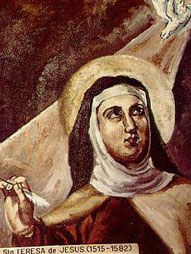 “We shall never learn to know ourselves except by endeavoring to know God; for, beholding His greatness, we realize our own littleness; His purity shows us our foulness; and by meditating upon His humility we find how very far we are from being humble.”– Saint Teresa of Avila
“We shall never learn to know ourselves except by endeavoring to know God; for, beholding His greatness, we realize our own littleness; His purity shows us our foulness; and by meditating upon His humility we find how very far we are from being humble.”– Saint Teresa of Avila
“There are more tears shed over answered prayers than over unanswered prayers.”– Saint Teresa of Avila
“It is here, my daughters, that love is to be found – not hidden away in corners but in the midst of occasions of sin. And believe me, although we may more often fail and commit small lapses, our gain will be incomparably the greater.”– Saint Teresa of Avila
“The tree that is beside the running water is fresher and gives more fruit.”– Saint Teresa of Avila
“O my God, what must a soul be like when it is in this state! It longs to be all one tongue with which to praise the Lord. It utters a thousand pious follies, in a continuous endeavor to please Him who thus possesses it.”– Saint Teresa of Avila
“Our body has this defect that, the more it is provided care and comforts, the more needs and desires it finds. “– Saint Teresa of Avila
“The feeling remains that God is on the journey, too.”– Saint Teresa of Avila
Tags: catholic, catholic podcast, catholic prayer, cathollc spirituality, humility, quotes, saint teresa of avila, Teresa of Avila
This entry was posted on Saturday, October 15th, 2011 at 8:37 am
You can follow any responses to this entry through the RSS 2.0 feed.
“Be A Man: Becoming the Man God Created You to Be” is important for all of us to read – male and female! 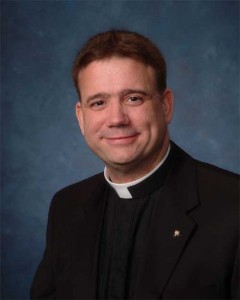  Bruce and I had the chance to speak with Fr. Larry Richards about the challenges faced by men in today’s culture to be authentically the males God desires them to be.  The emphasis is on the  importance of a healthy spiritual life in leading to true manhood.  Fr. Larry minces no words in what he offers and the challenges men of all ages.
 Bruce and I had the chance to speak with Fr. Larry Richards about the challenges faced by men in today’s culture to be authentically the males God desires them to be.  The emphasis is on the  importance of a healthy spiritual life in leading to true manhood.  Fr. Larry minces no words in what he offers and the challenges men of all ages.
[powerpress]
“Father Larry talks straight to men in his own manly style. He pulls no spiritual punches–I don’t think he knows how to! He pokes, pushes, sometimes verbally slaps men into being God’s men, all with an obvious love for them and faith in their ability to persevere to heaven.”
— Dr. Ray Guarendi, radio host and author
Check out this book at Igantius.com
 Also check out Fr. Larry’s interview
Also check out Fr. Larry’s interview
for his book on discernmentcalled “Surrender” on Inside the Pages #121Â
Tags: catholic, catholic podcast, catholic prayer, cathollc spirituality, male spirituality, manhood
This entry was posted on Thursday, October 13th, 2011 at 1:37 pm
You can follow any responses to this entry through the RSS 2.0 feed.




